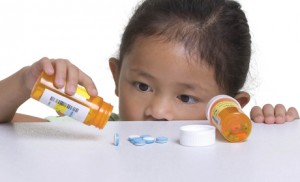 Kids of all ages, from tots to teens, are susceptible to accidentally taking the wrong medicine. Here’s how to prevent it and teach kids to treat their healthcare responsibly.
Kids of all ages, from tots to teens, are susceptible to accidentally taking the wrong medicine. Here’s how to prevent it and teach kids to treat their healthcare responsibly.
When Tots Get Curious
Cases of young children accidentally ingesting medicine not meant for them are not uncommon. In 2014, the Drug and Poison Information Center at Cincinnati Children’s Hospital Medical Center (CCHMC) addressed 19,000 exposures in children younger than 5 (numbers based on phone calls to the center). Of those exposures, 16,000 were to things in the house, like cleaning products and medicine, according to Alysha Behrman, RN, and certified specialist in poison information. Medication errors, like parents accidentally giving their child the wrong dose, comprised 1,100 of those calls.
When it comes to the unintentional ingestion of medicine, well, that’s the just the nature of kids younger than 5, says Behrman. Kids are naturally curious, and when a pill looks an awful lot like a piece of candy, it can be hard to resist. It’s best to keep cleaners, medicines and other toxic items up high where little ones can’t reach them. Got a climber? Keep unsafe items locked up. Parents should also take note that even though they have safeguarded their home, the same may not be true when visiting grandparents or friends.
The good news, says Behrman, is that about 90 percent of calls to the Drug and Poison Information Center were managed over the phone and didn’t require a trip to the ER. Typically, ER visits are necessary when a child ingests heart, pain or diabetic medication (visit cincinnatichildrens.org/service/d/dpic/default/ for a list of toxic medications that take only “one pill to kill” a toddler).
Teaching Kids Responsibility
It would be nice to transfer some of the responsibility of taking medicine to your child, but when it comes to something this important, how much control do you want to hand over?
“There’s no magic age for kids to take over responsibility,” says Berhman. She suggests that parents first have a conversation with their children’s doctor, and involve kids in that discussion. This teaches them about their medication, why they need to take it and what happens if they take it incorrectly.
Behrman says it’s a little easier to give kids responsibility over daily medication for a chronic condition like asthma or ADHD, because it can be incorporated into a daily routine. But acute medication taken for a brief period of time will likely require more supervision.
In fact, “supervision is key when transferring responsibility to children,” she says. Start by letting kids watch you measure their dose, then switch to you watching them perform the task. This is also a good time for parents to initiate conversations about medication versus drugs, and the dangers of sharing medicine with others.
Taking control over one’s medicine regime is an important responsibility. But with the right supervision and plenty of communication, you and your child should be able to handle it with confidence.





